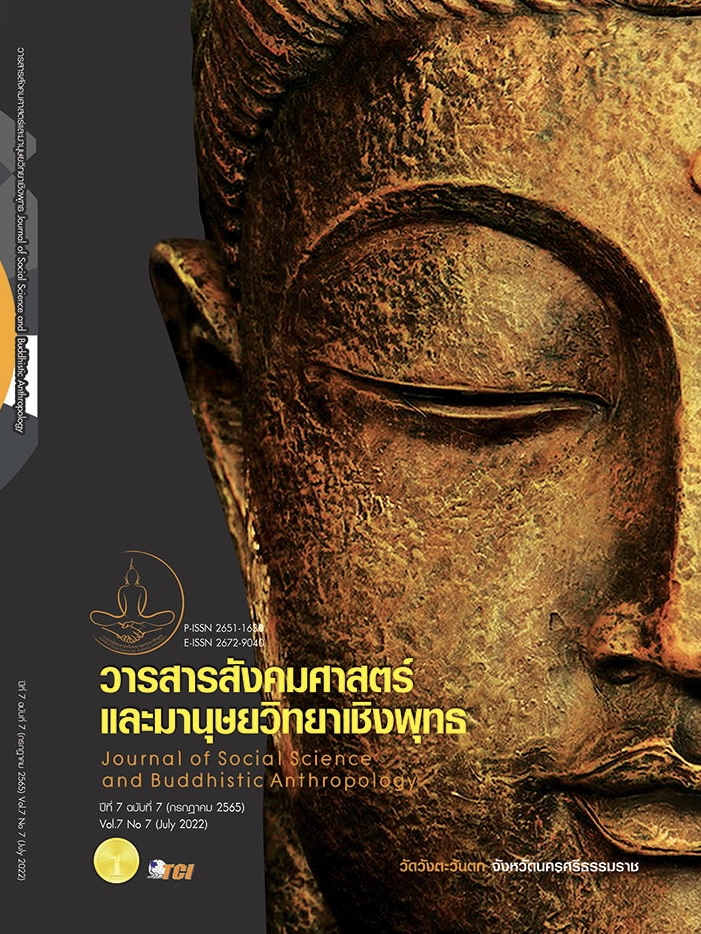STORYTELLING ON ELDERLY PEOPLE CHARACTER IN POPULAR THAI TV DRAMA IN DIGITAL AGE
Keywords:
Storytelling, Character, Elderly People, TV Drama, Digital SocietyAbstract
The Objective of this research article were to study storytelling on elderly people character in popular Thai television drama. It employs qualitative study through popular TV drama between 2557 and 2561 B.E. One most popular drama in each year, five dramas in total, has been analyzed through thematic analysis. It uses three main elements in the concept of storytelling, which are theme, character and setting. There are three main findings. Firstly, four themes have been presented in the dramas, which include elderly people and helpfulness, elderly people and revenge, elderly people and the past, and elderly people and meddling. Secondly, familiar characters of elderly people have been shown. These characters are being the helpers through their accumulated knowledge and experiences, being call as grandpa, grandma, papa and the old, along with their career, being stick with the past old day, being bossy, and dressing in plain or somber clothes. Thirdly, majority of scenes are home, temple, and forest. Its variety is less than other characters in the drama. These findings reflect that the medium ‘Thai TV drama’ in digital age is still telling the story of elderly people through familiar and stereotype meaning. It has not stepped into alternative meaning that appears in some areas of media which representation of the elderly people which has developed or changed some behaviors a lot from the past. Whilst storytelling in popular TV dramas in digital era, in this study, still has reflected various aspects of typical characteristics. It can be said that ‘there is no change’ that could allow the audience experiencing the development of meaning of elderly people in the context of digital age.
References
เกศราพร ทองพุ่มพฤกษา. (2563). แม่ เมีย และ “สัตว์โลกแสนสวย”นิยามแห่งความเป็นเพศหญิงในหนังสือนิทานภาพสำหรับเด็ก. วารสารวิชาการมหาวิทยาลัยธรรมศาสตร์, 13(1), 29-91.
ชมพูนุช พรหมภักดิ์. (2556). การเข้าสู่สังคมผู้สูงอายุของประเทศไทย (Aging society inThailand). เรียกใช้เมื่อ 5 กันยายน 2562 จาก http://library.senate.go.th/ document/Ext6078/6078440_0002.PDF
ฐิตินันท์ นาคผู้. (2561). พฤติกรรมการดูแลสุขภาพของผู้สูงอายุ. ใน ดุษฎีนิพนธ์สาธารณสุขศาสตรดุษฎีบัณฑิต สาขาสาธารณสุขศาสตร์ . มหาวิทยาลัยนเรศวร.
ทิพย์ภาศิริ แก้วเทศ. (2561). การเปลี่ยนผ่านละครโทรทัศน์ไทยจากยุคแอนะล็อกสู่ยุคดิจิทัล. ใน วิทยานิพนธ์นิเทศศาสตร์มหาบัณฑิต สาขาวิชานิเทศศาสตร์. มหาวิทยาลัย สุโขทัยธรรมาธิราช.
บุษยา วงษ์ชวลิตกุล. (2561). ความรู้และทัศนคติของผู้ดูแลผู้สูงอายุ กรณีศึกษาผู้ดูแลผู้สูงอายุในสถานสงเคราะห์คนชราบ้านธรรมปกรณ์โพธิ์กลาง และสถานสงเคราะห์คนชราบ้านธรรมปกรณ์วัดม่วงจังหวัดนครราชสีมา. ใน วิทยานิพนธ์บริหารธุรกิจมหาบัณฑิต สาขาวิชาการจัดการ. มหาวิทยาลัยวงษ์ชวลิตกุล.
ปัณณทัต กาญจนะวสิต. (2559). แนวทางการพัฒนาการประชาสัมพันธ์ของกองทัพบกในยุค 4.0. ใน วปอ. รุ่นที่ 60 สาขาวิชาการทหาร. วิทยาลัยป้องกันราชอาณาจักร.
ปุญญดา ดาศรี. (2556). ตัวละครผู้สูงอายุในนวนิยายของโอะงะวะ โยโกะ. ใน วิทยานิพนธ์อักษรศาสตรมหาบัณฑิต สาขาวิชาภาษาญี่ปุ่น. จุฬาลงกรณ์มหาวิทยาลัย.
สุธิดา สิงหราช. (2558). การประกอบสร้างภาพตัวแทนนางเอกยุคใหม่ในละครโทรทัศน์ไทย. ใน วิทยานิพนธ์นิเทศศาสตรมหาบัณฑิต สาขาวิชาสื่อสารการแสดง. วิทยาลัย นิเทศศาสตร์.
สุรพงษ์ มาลี. (2561). “ภาครัฐกับการเตรียมความพร้อมเข้าสู่สังคมสูงวัย”. วารสารข้าราชการ, 60(4), 5-8.
เอกชัย แสงโสดา และคณะ. (2562). พิศกะเทยหลากสีผ่านทีวีดิจิทัล: การสื่อสารความเป็นกะเทยในรายการโทรทัศน์ยุคดิจิทัลไทย. วารสารศาสตร์, 12(2), 165-178.
Downloads
Published
How to Cite
Issue
Section
License
Copyright (c) 2022 Journal of Social Science and Buddhistic Anthropology

This work is licensed under a Creative Commons Attribution-NonCommercial-NoDerivatives 4.0 International License.









